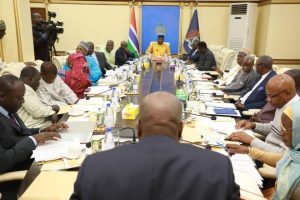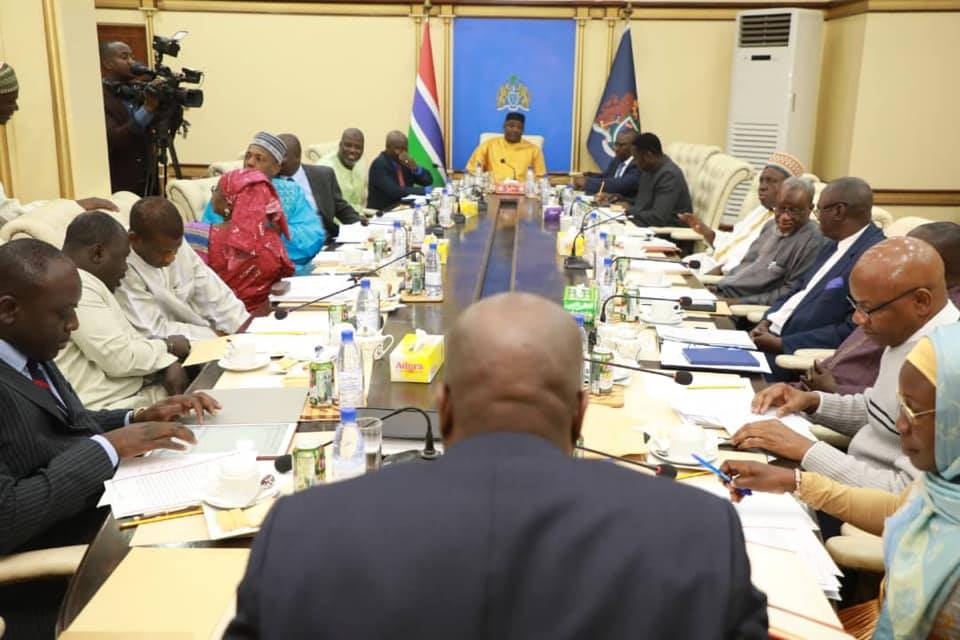 by Alagi Yorro Jallow.
by Alagi Yorro Jallow.
Fatoumatta: An alcoholic cannot deal with his addiction without giving up drinking. Our current economic development and growth is an unsustainable fiscal path. By cutting expenditure and trying to raise more taxes, and the government is withdrawing money from the market. When a government is in a financial crisis, we will see all sorts of desperate measures. The Gambia’s political class seems not to have understood the paradigm shift that becoming a sovereign borrower in international markets entails.
According to Collins English dictionary defines a Greek tragedy as “a play in which the protagonist, usually a person of importance and outstanding personal qualities, falls to disaster through the combination of a personal failing and circumstances with which he or she cannot deal.” Lately, the term has been used to connote the failure of the economy of Greece. Even then, the foibles of individual leaders and the effects of the financial crisis of 2008 still make for the qualities of a perfect Greek tragedy.
Fatoumatta: Unfortunately, for many decades, the Gambian political elite treated the two concepts of democracy and its attendant values—justice, the rule of law, and good governance and independent institutions as mutually exclusive—almost hostile. They viewed democracy as obstructionist and antithetical to the developmental agenda of the state. The authoritarian, imperial presidency, Big Man governance model, is held out as the desirable political device necessary to deliver development. Going to the market is analogous to a business going public.
Fatoumatta: Financial experts point out that Greece’s economic problems were precipitated by a country that lived beyond its means. Public spending soared with public sector wages rising over 50% between 1999-2007. The government also ran up significant debts paying for the 2004 Athens Olympics. After years of overspending, the country’s budget deficit (the difference between spending and income) spiraled, tragically, out of control.
If this modern rendition of the Greek classics has a familiar ring to it, it is a mirror of the Gambia’s current financial morass. The impulsive spending of vast sums of borrowed money on projects without high-return is beginning to tell a story. It is as if the god Plutus’s eyesight has been restored at the Temple of Asclepius, and the entire world is turned upside-down economically. Like Greece, the Gambia’s domestic and public debt bloated to GDP ratio increased threefold over the last five years to 71.3 billion and The Gambia’s current total debt both domestic and external amounted to D 71.3 billion (88 percent of GDP) and the increase of D9.4 billion on National Debt Service from 2019 to 2020 which represents ( approximately 37.5 percent of total tax, loans, and grants revenue) on debt services the highest increase since President Adama Barrow won elections in late 2016, which is above the 7.5 percent global recommended rate. The government has also run up massive debt paying for the mega infrastructural project, among other big-ticket infrastructural investments that appear to have no immediate financial returns. With a contracting economy, whose growth is projected to plunge to 1.5% according to a recent World Bank report, the country could be writing its version of the Greek tragedy.
Fatoumatta: The Gambia’s Finance Minister Mambury Njie has the unenviable job of steering the nation through these turbulent financial times. Because the Gambia has a budget hole, where expenses are more than revenue, the Finance Minister revealed that borrow both domestically and externally to bridge this deficit, which stands at D9.4 billion. A statement attributed to a senior government official says, “Japan has borrowed 238% of its GDP, the US is at 107% while the Gambia is only at 57%. All these countries have developed because of borrowing.”
No doubt the senior government official has the Gambia’s best interests at heart. However, the statement on borrowing passes for a sophist’s attempt to explain away the inexcusable. The juxtaposition of the Gambia’s and Japan’s borrowing makes the Gambia s debt seem favorable; until other details are examined that reveal an economy of truth. For instance, no comparison is made of the interest rates on loans taken up by both countries. The Gambia has been known to take up expensive short-term debt like the Eurobond. It has also taken up loans for infrastructural development at near double-digit interest rates. These external loans are subject to the vagaries of foreign exchange fluctuations. Every time the Gambian Dalasi devalues, the country’s indebtedness increases by a significant margin.
Fatoumatta: Japan, on the other hand, relies nearly exclusively on domestic debt. Some 70% of Japanese government bonds are purchased by the Bank of Japan and 25% by Japanese banks and trust funds. Foreign investors hold only a paltry 5% of government bonds. Japanese debt is thus insulated from foreign exchange fluctuations. Further, the interest rates on these bonds are many times negative, meaning the government pays back less than it borrows.
Fatoumatta: The Minister’s budget approved by the National Assembly 94 billion domestically and externally. This is even as the International Budget Partnership Institute of Public finance has termed unrealistic the Minister of Finance billion spending plan for the 2020/2021 financial year. A memorandum from them cautions against the government’s appetite for debt, saying, “The amount repaid as public debt is increasing amid reduced revenue collections owing to the recent tax laws amendments and a massive government expenditure fuelled by the executive arm.
There are calls for the Gambia’s public debt to be restructured. The rate at which it has borrowed points it towards debt distress. The aphorism “when your outgo exceeds your income, your upkeep is your downfall” is an apt description of where the country stands and where it is headed sans interventionist measures. With Covid-19 threatening to exacerbate an already bad environment, one wonders how could Mambury Njie safely juggle all his balls or whether he is set up to be the face of the Gambia tragedy. Amid the Covid-19 pandemic that has affected and slowed down most operational activities and still poses severe problems to world’s economies, the Gambia government is on spending overdrive, sinking Gambians deeper into debts without anything to show for it.
Mambury Njie, disclosed that the government spent a whopping 5.08 billion dalasi in the first quarter of 2020 (from January through April) up by 29% from 3.95 billion dalasis during the same period in 2019 increased spendings in just four months when the pandemic was supposed to account for lower economic activities? The Works and Infrastructure Ministry has already absorbed 73% of its total approved budget in 2020, spending D428 million out of 436 million allocated for roads and bridges shady Rehabilitation Project.
Fatoumatta: The Gambian economy is not well, and the government has taken much debt. Interest payments on debt are eating into recurrent expenditure, threatening to grind daily government operations to a halt. Every passing day, our problems assume more frightening dimensions. Productivity is sinking, the tax to GDP ratio is laughable, borrowing has increased so much as to threaten growth and economic viability. None of these discourages the kleptocrats, and there is no let-up in the stealing of public funds.
Many Gambians have wondered why we are told that the economy is growing at a brisk 5 to 6 percent year after year, yet we are not feeling it. Instead, big companies are issuing profit warnings and laying off people. The Gambia’s public debt has increased threefold over the last five years to 71.3 billion and The Gambia’s current total debt both domestic and external amounted to D 71.3 billion (88 percent of GDP) and the increase of D9.4 billion on National Debt Service from 2019 to 2020 which represents ( approximately 37.5 percent of total tax, loans, and grants revenue) on debt services the highest increase since President Adama Barrow won elections in late 2016. Although the data shows that the economy is growing, the tax base is not expanding, and revenue is falling short as debt service charges are rising.
Fatoumatta: The foreign debt consists of market debt (the Eurobonds), syndicated loans, and term loans. Eurobonds and syndicated loans are similar. The critical difference is that syndicated loans are short-term notes, typically sold in two-year cycles, which banks typically hold to maturity. Amortization of bonds and syndicated loans (i.e., repayment of principal) is financed by new market debt and is known as refinancing. The principal on bank debt has to be repaid. The key concern with market debt is the refinancing risk. The government has to be able to sell new bonds as old ones mature. The market conditions can change, or the investor’s risk-perceptions can change to the extent that the government is unable to sell enough bonds in which case it defaults.
The principal concern with market debt is the refinancing risk. The government has to be able to sell new bonds as old ones mature. The market conditions can change, or the investor’s risk-perceptions can change to the extent that the government is unable to sell enough bonds in which case it defaults. Alternately, it may have to offer such high returns that sooner or later, it cannot afford the interest, which amounts to the same thing— default. The preferred option is to float another Eurobond, preferably a long-dated one that does not come up for refinancing soon. The alternative is more syndicated loans, which will cost more and come up for refinancing in two years. The market environment that they will be doing this is not favorable.
Fatoumatta: President Adama Barrow’s government mismanagement and plunder of the economy is a matter of public record. Barrow’s government is now stuck between the hammer of the markets and the anvil of politics. Finance and Economic Affairs Minister, Mambury Njie informed lawmakers in the hallowed chamber that out of US$ 1.8 billion pledged by various development partners at the donor conference, only US$183 million (10 percent of the pledged), has been disbursed so far.
Fatoumatta: Most of the proceeds of the runaway borrowing could not be traced, because the government never invested in the economy in the first place. The Gambia is in a debt crisis: The government cannot pay, so let everybody, sooner or later, sit down to a banquet of consequences of higher taxes. Let everyone experience and bear the consequences of this government’s act of economic and financial mismanagement. Where is the next target for taxation? Would it be medicines? If Adama Barrow and his government know that their problem is in borrowing, then the simple thing to do is to stop immediately and invest in the production section of the economy.

